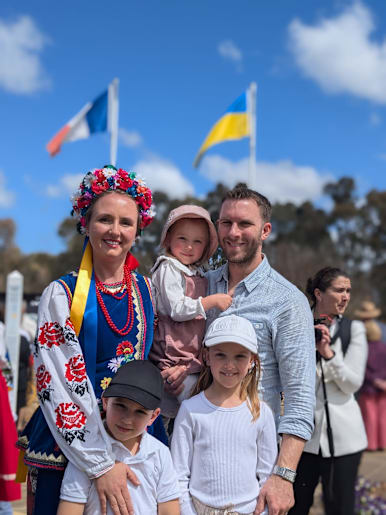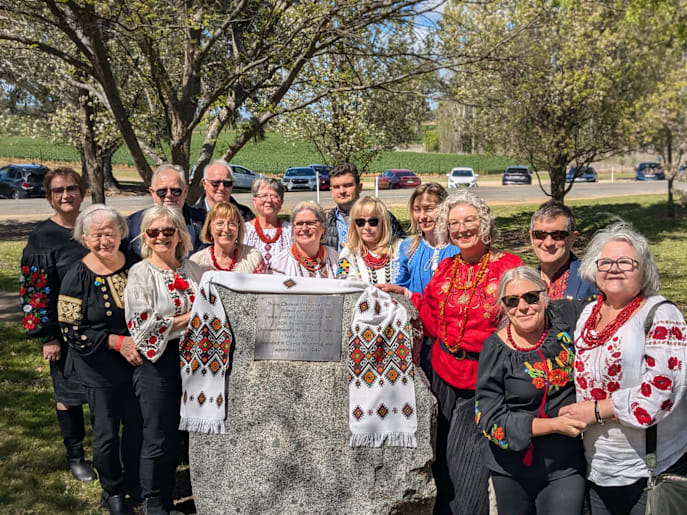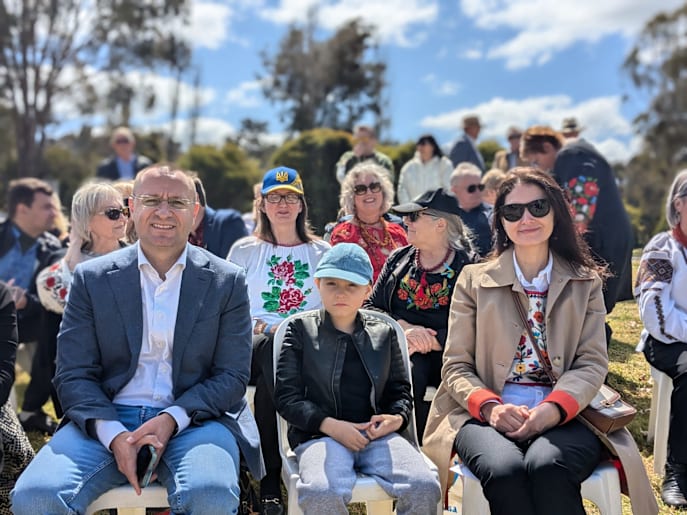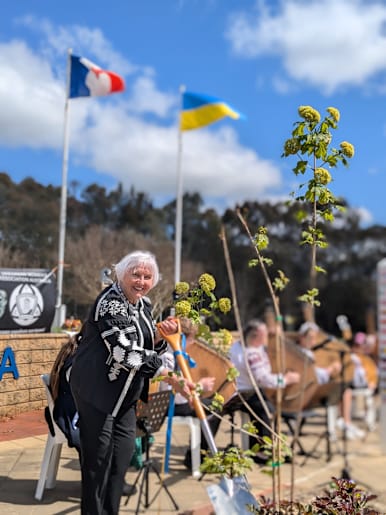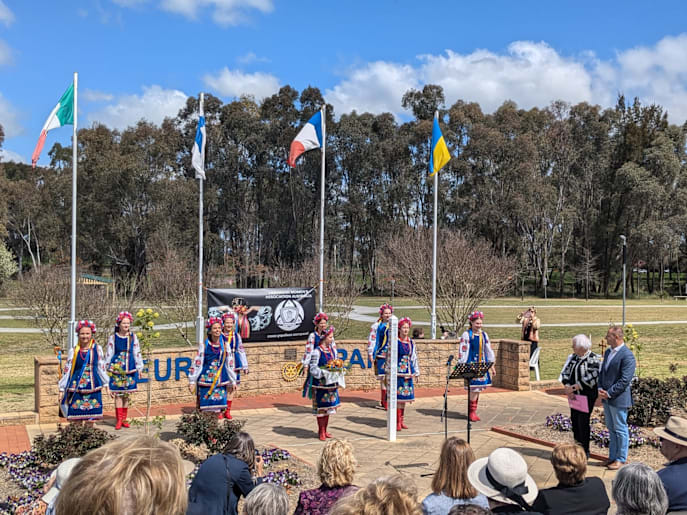Clear blue skies and fields of golden canola weren't planned especially for the 75th anniversary of the Ukrainian Women's Association of Australia in Cowra, but blue and gold were everywhere to see at the celebration of life, resilience and determination.
The Ukrainian Women's Association of Australia (UWAA) marked 75 years of the organisation, founded in Cowra Migrant Camp in 1949, on Saturday 21st of September.
Many visitors travelled from Sydney, Canberra and as far as Geelong to attend, each telling stories of the preservation of culture and the establishment of churches, educational and community groups to preserve their identity. This task fell mainly to women, as men often went to work in agriculture or to help build Australia's postwar infrastructure, with the work often separating families in search of work and wages.
With a gathering of Ukrainian descendants and well-wishers, UWAA President Luba Kaye presented the organisation's unique history:
"We're extremely grateful to those far-sighted women who saw a desperate need, and stepped up to do something about it. The association they began on the 13th of September 1949 is still going strong 75 years later. I don't think even they thought it would be going that long."
Latest Stories
On the organisation's 50th anniversary, a stone plinth was placed at Europa Park, along with five elm trees - one for the federal executive and one for each of the four states (NSW, SA, VIC and WA) where the organisation had taken root.
"I'd like to thank the people of Cowra for taking such good care of our trees, because the elm trees look extremely healthy."
To mark the 75th anniversary, President Kaye had planted two Kalyna, or 'guelder' roses.
Ms Kaye said "The Kalyna rose is a symbolic flower of Ukraine. Which is admired not only for its beauty, but its great resilience - a quality so evident in Ukraine today. One of the main goals of the UWAA is to educate people about and to maintain our traditions."
From 1949 onward, the UWAA has consistently played role in preserving Ukrainian identity in diasporic and wider Australian community. A gift of bread and salt - a luxury in bygone days - was shared with group prior to a dinner later in the afternoon.
Not far from everyone's minds was the ongoing conflict, which even before 2022 had raged in the Crimea. With the UWAA's foundations in post-war migration, the group had again galvanised its efforts to support Ukraine.
Present was the Ukrainian Ambassador, Vasyl Myroshnychenko and his wife, Lina. Speaking on the conflict, Mr Myroshnychenko said "We can't change geography, we wish we had Australia as a neighbour."
He also thanked Australians for their support for the war, in which Russian forces had intensified their targeting of civil infrastructure ahead of winter.
"I was just in Ukraine in August and people I met said 'make sure you say thank you to the Australian government and its people who have been helping us,' - they really feel that people 15,000 km away feel their pain. There’s a strong sense of gratitude to Australia, but the war is still ongoing."
Mr Myroshnychenko emphasised that the nation's struggles were reflected across the Pacific, where other authoritarian regimes were awaiting the outcome of the conflict, which may influence Australian security interests; "Their behaviour will embolden other authoritarian countries in the Pacific to actually do something that may hurt Australia’s interests heavily. The rules-based order is not something abstract. It’s real, it’s making nations in the pacific vulnerable because the issue of sovereignty and coercion are playing out today."
Australia is presently considering what to do with its decommissioned, US-made M1A1 Abrams main battle tanks, which are being replaced with a new variant for Australian service. Australia's ASLAV's - light armoured reconnaissance vehicles are also being replaced. Other weapons platforms, like the MRH-90 Taipans - also due to be mothballed are desperately being campaigned to be pressed into service on the front.
"My message is simple, supporting Ukraine today is part of Australia’s regional stability. We’re not asking for boots on the ground, we’re not asking you to fight, but we do ask for some decommissioned equipment or stock you can provide.” Mr Myroshnychenko said, adding "Their behaviour will embolden other authoritarian countries in the Pacific to actually do something that may hurt Australia’s interests heavily. The rules-based order is not something abstract. It’s real, it’s making nations in the pacific vulnerable because the issue of sovereignty and coercion are playing out today."
Back in Cowra, Euginia Kaminsky says Australians can contribute dry food, warm clothing, even non-lethal aid such as medical equipment and surveillance drones.
Ms Kaminsky said “Well, if people can collect for soldiers – dry food, warm clothing. The money we collect tends to go to mothers of children who might be displaced. “For us Ukrainians in Australia - it’s hard because it doesn’t feel like you’re ever doing enough. It doesn’t matter how much you do; you’ll hear about a whole town being destroyed. I have a house, a life – but in Lviv (on the western side of Ukraine) they’ve bombarded a big city – of a family of five only the father survived. Just imagine his life now?”
With the resilience of Ukrainians on display at Europa Park, the conflict has become an emboldening display of tenacity on behalf of Australia's Ukrainian population.
Australians can provide support to Ukraine through the Ukrainian Crisis Appeal, managed by Rotary Australia.

